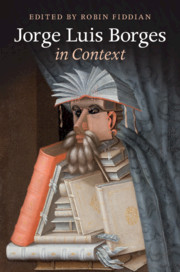Book contents
- Jorge Luis Borges in Context
- Jorge Luis Borges in Context
- Copyright page
- Contents
- Illustrations
- Contributors
- Acknowledgements
- Permissions
- Note on Primary Sources and Editions Used
- Chronology
- Note on Translations and Abbreviations
- Introduction Borges in Context, Context in Borges
- Part I Self, Family, and the Argentine Nation
- Chapter 1 Borges and the Question of Argentine Identity
- Chapter 2 Borges and the Banda Oriental
- Chapter 3 Borges in Person: Family, Love, and Sex
- Chapter 4 Jorge Luis Borges’s Fictions and the Two World Wars
- Chapter 5 Dictatorship and Writing (1976–1983)
- Chapter 6 The Public Author and Democracy (1984–1986)
- Chapter 7 Borges and Las Islas Malvinas
- Chapter 8 Borges and Sarmiento
- Chapter 9 Borges and the Gauchesque
- Chapter 10 1920s Buenos Aires
- Chapter 11 Borges and the Argentine Avant-Garde
- Chapter 12 The Argentine Writer and Tradition
- Chapter 13 Borges, Tangos, and Milongas
- Chapter 14 Borges and Bioy Casares
- Chapter 15 Borges and Popular Culture
- Chapter 16 Argentine Responses: César Aira and Ricardo Piglia
- Part II The Western Canon, the East, Contexts of Reception
- Further Reading
- Index
Chapter 8 - Borges and Sarmiento
from Part I - Self, Family, and the Argentine Nation
Published online by Cambridge University Press: 16 January 2020
- Jorge Luis Borges in Context
- Jorge Luis Borges in Context
- Copyright page
- Contents
- Illustrations
- Contributors
- Acknowledgements
- Permissions
- Note on Primary Sources and Editions Used
- Chronology
- Note on Translations and Abbreviations
- Introduction Borges in Context, Context in Borges
- Part I Self, Family, and the Argentine Nation
- Chapter 1 Borges and the Question of Argentine Identity
- Chapter 2 Borges and the Banda Oriental
- Chapter 3 Borges in Person: Family, Love, and Sex
- Chapter 4 Jorge Luis Borges’s Fictions and the Two World Wars
- Chapter 5 Dictatorship and Writing (1976–1983)
- Chapter 6 The Public Author and Democracy (1984–1986)
- Chapter 7 Borges and Las Islas Malvinas
- Chapter 8 Borges and Sarmiento
- Chapter 9 Borges and the Gauchesque
- Chapter 10 1920s Buenos Aires
- Chapter 11 Borges and the Argentine Avant-Garde
- Chapter 12 The Argentine Writer and Tradition
- Chapter 13 Borges, Tangos, and Milongas
- Chapter 14 Borges and Bioy Casares
- Chapter 15 Borges and Popular Culture
- Chapter 16 Argentine Responses: César Aira and Ricardo Piglia
- Part II The Western Canon, the East, Contexts of Reception
- Further Reading
- Index
Summary
Various prologues and public statements made by Borges about Domingo F. Sarmiento respond to specific historical conjunctures where violence evinces anxiety about barbarism. In 1944, the prologue to ’Recuerdos de provincia’ responds to the immediate context of the Second World War and equates Nazism unequivocally with barbarism. In 1957 and 1968, Sarmiento’s formula of civilization/barbarism continues to serve as a framework for interpreting reality under Perón’s two governments. At the same time, however, the other classic work of Argentine literature, ’Martin Fierro’, evokes a world of courage and rebellion that crystallizes the aesthetic phenomenon. With the return of Perón in 1974, Martin Fierro is displaced again by Facundo as a compelling archetype in and for the national imaginary.
- Type
- Chapter
- Information
- Jorge Luis Borges in Context , pp. 67 - 74Publisher: Cambridge University PressPrint publication year: 2020

